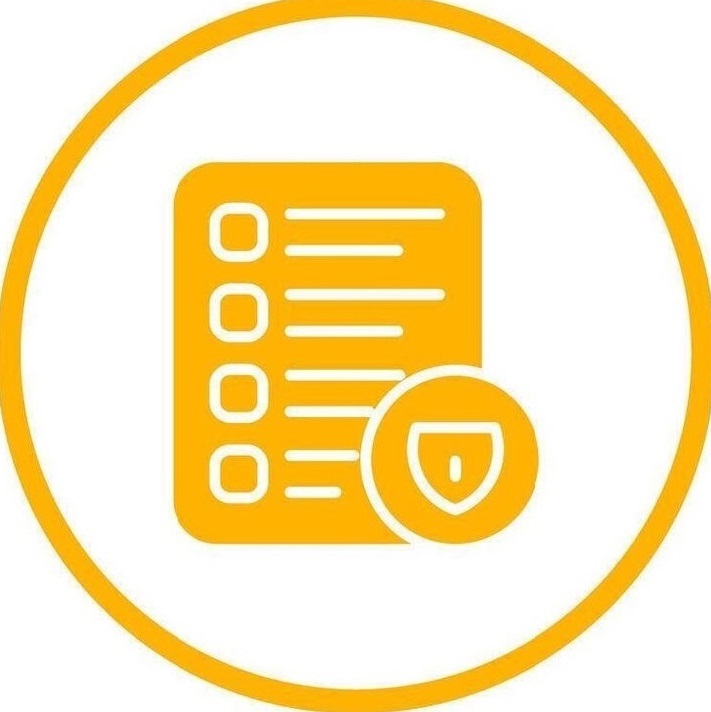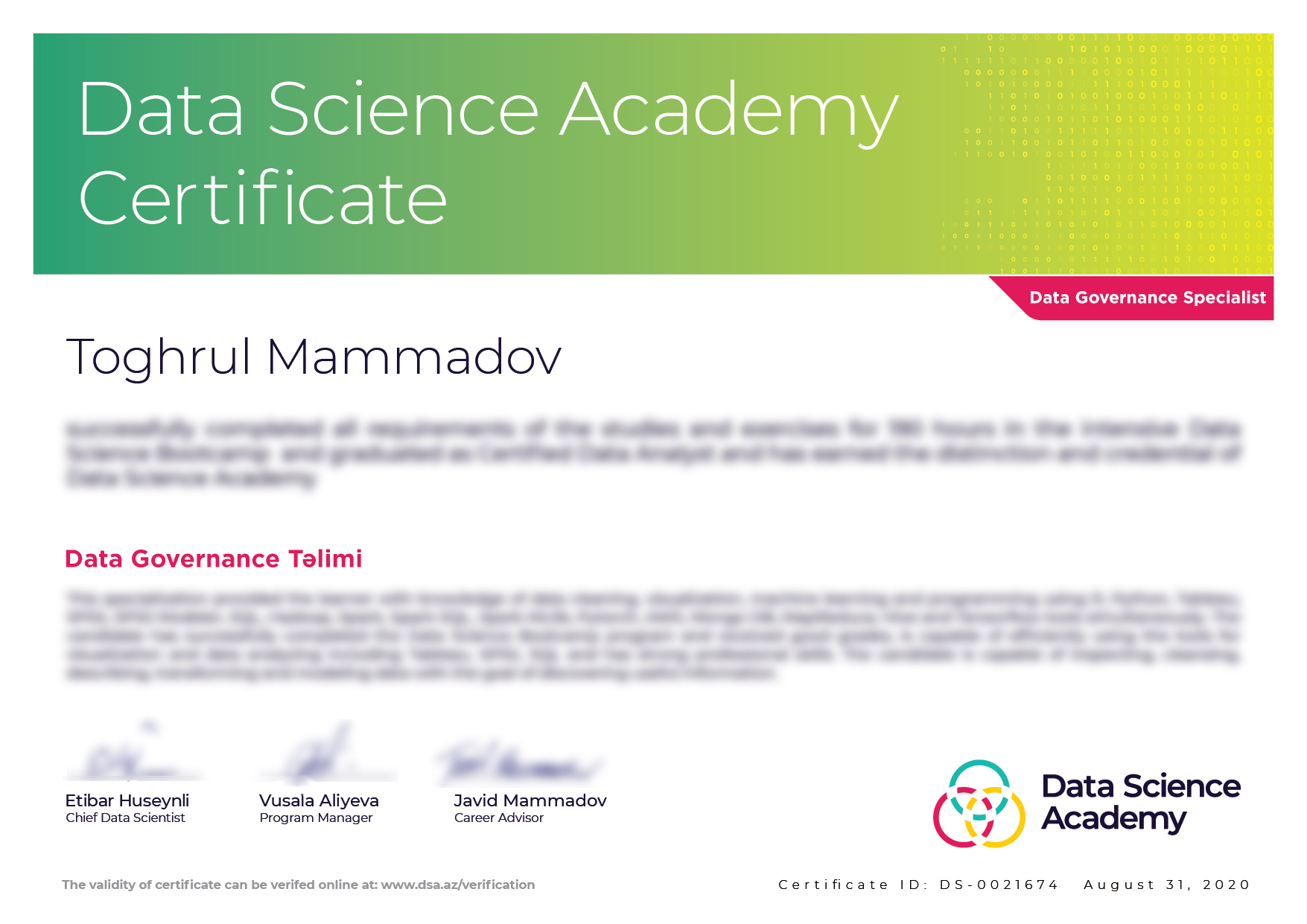
Data Governance
Data Governance training covers the basic principles, tools and processes necessary for businesses and government organizations to effectively manage their data assets. In this training, you will learn methodologies to understand the strategic value of data, standardize business terminology and ensure data quality. In addition to topics such as metadata management, data lineage, provenance, cataloging and business vocabulary development, the main roles and responsibilities that carry out this process, their knowledge and skill requirements are also covered. Through practical tasks and real industry examples, you will master Data Governance tools (Collibra, Informatica, OpenMetadata) and create data governance standards in your company. As a result, you will improve your data governance skills to make decision-making processes more reliable and transparent.
Training table
Information about the training
In modern times, data has become the most critical asset of every organization. Quality and managed data is a key requirement for all types of business decisions. In this training, you will learn how to manage the life cycle of data - from creation to analytics. It includes metadata standards (Business Glossary and Data Dictionary), data tracking (Data Lineage), application of quality metrics (Accuracy, Completeness), as well as the use of leading tools such as Collibra and Informatica. Also, data policy development with keys, functions of the Data Steward role and mechanisms of cross-departmental collaboration will be taught in a practical way. After the training, you will be able to create a single business data dictionary and learn to implement it within the organization. At the same time, you will be able to manage compliance with standards such as Compliance, GDPR, HIPAA by defining data quality rules, monitoring reports, open source or other commercial tools.
Who is this training for?
- Data Analysts, Data Science Specialists – To work with more organized and quality data
- IT Specialists and Data Engineers – To master metadata, data catalog and lineage management
- Business Analysts and Business Managers – To increase the reliability of data-based decisions
- Risk and Compliance teams – To manage data in accordance with laws such as GDPR, HIPAA
- Data Owners and Administrators – To formulate and implement data strategy
- Data Steward and Data Governance teams – To ensure data quality and policies
- System Archives and Anyone working with Data – To understand and manage the full value of data
Certificate
Those who successfully complete the training will be awarded a Certified Data Governance Specialist certificate, while others will be awarded a certificate of participation. You can see a sample certificate on the right.

Get started with Data Governance
Data Governance Tutorial
The Career Force
This video provides information about Data Governance and explains in general terms what it is. Video Courtesy: The Career Force.
Syllabus
Session 1
The strategic value of data for organizations
The concept and basic principles of Data Governance
Business benefits: decision quality, efficiency, compliance
Consequences of poor governance: incorrect data, breaches
Case Study 1
Application examples for private and public sectors (from the real sector)
Session 2
Business Glossary
Standardization of terms and explanation with business perspective
Glossary structure: Term, Definition, Owner, Domain
Version control and approval flow
Workshop: Glossary building (Axon / Excel)
Case Study 2
Application examples for private and public sector (from real sector)
Session 3
Data Dictionary
Technical metadata: data type, size, nullability, keys
Difference between Dictionary and Glossary
Metadata extraction (SQL, ETL)
Hands-on: Creating a Dictionary
Case Study 3
Application examples for private and public sectors (from the real sector)
Session 4
What is a Data Catalog and why is it important?
Metadata discovery and classification
Semantic layer and search capabilities
Demo: OpenMetadata, Alation, Purview
Case Study 4
Application examples for private and public sectors (from the real sector)
Session 5
Data Lineage Types: Table, Column, End-to-End
Source-Target Mapping and Change Impact
Reading and Using Diagrams
Workshop: Building Lineage on ETL
Case Study 5
Application Examples for Private and Public Sectors (from Real Sector)
Session 6
Data Quality Criteria: Accuracy, Completeness, Consistency, Timeliness, Validity
Profiling and validation rules
Monitoring and rule engine usage
Tools: Informatica DQ, Talend DQ, OpenRefine
Case Study 6
Application examples for private and public sector (from real sector)
Session 7
DQ metrics review and in-depth review
Data Profiling: NULL, repetition, pattern
Data Cleansing Tools: deduplication, standardization
Root Cause Analysis (RCA):
System inconsistencies, human errors and input errors
Data integration errors
Case Study 7
Data capture, transformation, transfer processes
Session 8
Most popular tools:
Informatica (Axon, EDC, DQ)
Collibra, Alation, Microsoft Purview
Open-source: OpenMetadata, DataHub, Amundsen
Function comparison and live demo
Case Study 8
Application examples for private and public sector (from real sector)
Session 9
Data Policy and Stewardship Structure
Workflows: glossary approval, DQ issue, lineage update
KPIs and maturity model
Audit and Change Management
Case Study 9
Application examples for private and public sector (from real sector)
Session 10
Data Owner – Strategy and Decision
Data Steward – DQ and Glossary
Data Architect – Structure and Integration
Analyst – Analysis and Value Extraction
Team Building: Skills and Experience
Governance Council and Interdepartmental Collaboration
Case Study 10
Private and Public Sector Application Examples (from Real Sector)
Session 11
Create Glossary + Dictionary
Metadata extract → catalog
Lineage and DQ rule implementation on ETL
Governance Portal and Report Layout design
Real-life use case (e.g. bank, government, retail sector)
Case Study 11
Application examples for private and public sector (from real sector)
Trainers
Bahruz Gasimov
EXPERT FOR DATA QUALITY AND ASSURANCE MANAGEMENT, PASHA BANKOur professional trainer Bahruz Gasimov currently works as an “Expert in Data Quality and Assurance Management” at Pasha Bank. He has also worked in the data field at companies such as TuranBank OJSC, Yapı Kredi Bank Azerbaijan, and Unibank, and has over 14 years of professional work experience.